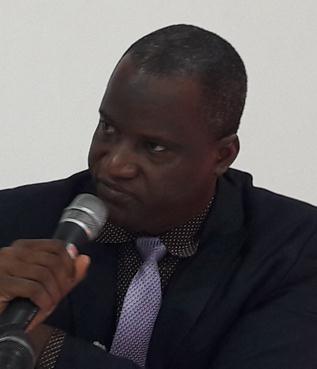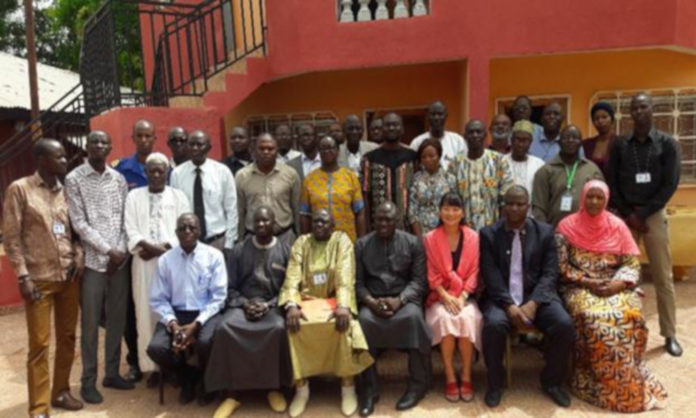By: Sheikh Alkinky Sanyang
The Minister of the Environment, Climate Change and Natural Resources, has called on the people of the Gambia, to put up concerted efforts in curbing the negative impacts of the usage of pesticides and chemicals. Lamin Dibba said his Ministry is aware of the health concerns resulting to local exposure to pesticides and chemicals especially Persistent Organic Pollutants otherwise known as POPs, and in particular their impact on women and unborn generations; that as a community with a low level of awareness, The Gambia has recognize the urgent need to take steps towards the development of an institutional framework for the sound management of chemicals and pesticides, to support a rapidly growing industrial and agricultural sector.
The Environment Minister made these remarks during the opening ceremony of the national inception workshop on institutional capacity building, for the implementation of the multi-lateral environment agreements in the Gambia, held at a local hotel. Participants were drawn from all walks of life dealing with chemicals and pesticides, and the day long dialogue was designed to capacities stakeholders on the dangers one gets, during the utilization of chemicals and pesticides, most especially, farmers.

Government in partnership with development partners and UNEP, implemented this important project as part of the implementation of the Multilateral Environment Agreements such as the Stockholm Convention on Persistent Organic Pollutants (POPs), The Basel Convention on control of Trans-boundary movement of hazardous wastes and their disposal, The Rotterdam Convention on the Prior Informed Consent Procedure on International trade in Hazardous chemicals, The Minamata Convention on Mercury and the Strategic Approach to International Chemicals Management (SAICM).
The aforementioned Conventions the Minister disclosed, have a common objective of protecting human health and the environment; that the Government of The Gambia attaches high priority to reducing chemical and pesticide pollution, and to promote sound management of chemical and pesticide wastes. He pointed out that the country had been working closely with international partners on the implementation of the Chemicals Conventions, which it considered crucial to further strengthening international commitment on the reduction of chemical exposure.
To meet her obligations under the various conventions, Minister Dibba disclosed that the Gambia had developed strategies and plans that will outline the situation of chemicals and pesticides in the country, with the ultimate goal of protecting human health and the environment from the risks posed by the irresponsible use, management and discharge of chemicals and pesticides.
He told the participants that turning to the resources required to implement the MEAs, it is impossible not to over emphasize the importance of consolidating the resource base to assist countries in the implementation of conventions and other activities, to protect human health and the environment; that he is confident the special programme to support institutional strengthening at the national level for implementation of the Basel and Rotterdam Conventions on the prior informed consent procedure for certain hazardous chemicals and pesticides in international trade, the Stockholm and Minamata Convention and the Strategic Approach to Chemicals Management established by the United Nations Environment Assembly at its first session, would play an important role in that regard.
The objective of the Special Programme he said, is to support country-driven institutional strengthening at the national level, in the context of an integrated approach to address the financing of the responsible management of chemicals and chemical wastes, taking into account the national development strategies, plans and priorities of each country, to increase sustainable public and institutional capacity for the responsible management of chemicals and wastes throughout their life cycle. Institutional strengthening under the Special Programme will facilitate and enable the implementation of the Chemical Convention to which the Gambia is party to.
The successful implementation of the Special Programme funded projects he said, will derive a lot from civil society and NGO inputs, and therefore public participation is critical in addressing chemical and pesticide issues and their health and environmental effects, and in developing adequate responses to their situation and circumstances, including opportunities for providing input at the national level, regarding implementation of the Conventions.
“Recognizing the importance of stakeholder participation, the National Inception Workshop is being held to map out strategies of implementation and to identify roles and responsibilities for different stakeholders. Chemicals and pesticides, impact on many sectors including policy-making, law-making, environmental protection, agriculture, public health, industry and the private and public sectors, and various interest groups. In order to make an effective and successful project, a wide range of stakeholders must be involved and engaged in the process,” Minister Dibba pointed out.
Some of the chemical substances are pesticides, he said whilst many others are industrial chemicals or unwanted products of industrial processes or combustibles that are toxic, and adversely affect human health and the environment across the world. They can be transported by wind and water, and POPs generated in one country, can affect people and wildlife far from where they are used and released. This therefore calls for the need to engage other countries in the crusade, and to mitigate negative impacts.
“I would also like to acknowledge the support of the Special Programme Secretariat and other partners, in the spirit of cooperation and commitment for working with the Government of President Adama Barrow, in trying to meet our obligations towards MEAs. We should all understand that environmental protection through responsible management of chemicals, is not the Government’s duty alone. But all must demonstrate their commitment and take an active role,” he concluded.
In his welcome remarks, the Executive Director of the NEA, Momodou Jama Suwareh disclosed that chemicals are important determinants for sustainable development and responsible environmental health and quality of life. But noted that while the use of chemicals in all human activities e.g. agriculture, health, energy production, manufacture, services and residential, contributes to improving the quality of life, it also raises concerns about its harmful effects on workers, consumers, the environment and society at large, through exposure.
Suwareh further adduced that accidental releases from the distribution, consumption and disposal of chemicals, may permanently damage soil, water and air.
Suwareh, said the Stockholm Convention is a legally binding international instrument, designed to lead to the gradual decrease of the presence of persistent organic pollutants in the environment. He noted that the Gambia is a party to the Stockholm Convention; that POPs are toxic chemicals adversely affecting human health and the environment around the world; that they can be transported by wind and water, Suwareh warned that most POPs generated in one country, can and do affect people and wildlife far from where they are used and released and they persist for long periods of time in the environment and can accumulate and pass from one specie to the next, through the food chain.
According to Omar Bah, the Registrar of pesticides and hazardous chemicals at the NEA, the objectives of the national workshop is to sensitize stakeholders on the project and its activities, and to encourage support, cooperation and commitment from stakeholders, for the implementation of the Project, and foster inter-institutional and bi-lateral collaborations in the implementation of the MEAs.

Bah further pointed out that the objectives include capturing the experiences, expertise and concerns of stakeholders / resource persons, and factoring them into the project implementation, to come up with recommendations that will enhance the successful implementation of the Project.
To enlighten the people living in the Gambia on responsible chemical management, Bah said the National Environment Agency in collaboration with relevant stakeholders, organized the workshop to raise public awareness on the situation of chemicals and related issues; that some of the expected outcomes of institutional strengthening through the Special Project, is to develop and monitor the implementation of national policies, strategies, programmes and legislation, for the responsible management of chemicals and wastes; promote the adoption, monitoring and enforcement of legislation and regulatory frameworks and to promote the mainstreaming of the responsible management of chemicals and wastes into national development plans, national budgets, policies, legislation and implementation frameworks at all levels.
This important dialogue was lead and facilitated by Kei Ohno-Woodall, Programme Officer at the Secretariat of the Basel, Rotterdam and Stockholm Conventions. Woodall said the objective of the Rotterdam Convention is to promote and share responsibility and cooperate on efforts among parties in International trade of hazardous chemicals, in order to protect human health and the environment from potential harm.




















